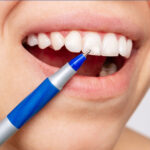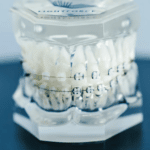What You Should Know About Sports And Braces
For a lot of kids, playing sports is a rite of passage. It’s a great opportunity to make friends, get active, and learn some of life’s most meaningful lessons—all while having fun. And while there are some physical limitations that can prevent kids from playing sports, having braces shouldn’t be one of them. If you or your child are worried about the impact braces can have on an athlete’s game face, you’ll want to read on as we detail what you should know about sports and braces.
An orthodontic mouthguard provides much-needed protection
Perhaps the single most important piece of equipment someone can do to protect their braces while playing sports is to wear a mouthguard. Whether playing contact sports like football or hockey or sports that lack contact like tennis or gymnastics, we recommend always keeping a mouthguard in during the activity. But the type of mouthguard worn is equally as important as wearing one, and we always suggest wearing an orthodontic mouthguard.
Regular mouthguards that are rigidly molded do an adequate job of protecting the teeth, but they can damage or shift a set of braces’ brackets. Orthodontic mouthguards are made from silicone and offer both the protection and flexibility that an athlete in braces needs. In most cases, an orthodontic mouthguard should be readily available and can be purchased on Amazon or at your local sporting goods store.
In addition to an orthodontic mouthguard, being vigilant with other forms of protection can help prevent mouth injuries. For example, wearing protective gear like helmets, faceguards, and sunglasses are all added steps an athlete can take when trying to shield the mouth from injury.
Proper care of an orthodontic mouthguard is key
We’ve talked a lot about the importance of an orthodontic mouthguard, but it bears mentioning that some maintenance is involved with wearing one. Be sure the orthodontic mouthguard is rinsed and brushed with hand soap or dish soap before use. Remember, the human mouth is full of bacteria, so cleanliness is critical.
An orthodontic mouthguard should be stored in a hard case with holes for venting when not in use. And when it starts to show signs of wear or no longer fits properly, it’s time to dispose of it and purchase a new one.
Injuries and mishaps are still a possibility
It’s essential you understand that even when wearing a mouthguard, it’s still possible for contact during sports to cause an injury or problem with braces. If this does happen, don’t panic. Minor incidents like loose brackets are relatively common and easily fixable. If something like a loose bracket does occur, call Angeloni Orthodontics as soon as possible to schedule an appointment for repair.
Some of the injuries most commonly sustained by athletes in braces include cuts to the cheeks, tongue, and lips and broken or chipped teeth. Additionally, athletes can experience a dislocation of the temporomandibular joint, also known as TMJ. These types of injuries, though they vary in severity, can all be painful and jarring to experience.
Have questions about sports and braces? Angeloni Orthodontics is here
We know the thought of playing sports with braces can be a little scary, but with the right equipment and maintenance routine, there’s really nothing to fear. However, if you do have questions or a mouth injury occurs during sports, don’t hesitate to reach out to Angeloni Orthodontics.
_________________________________________
Angeloni Orthodontics is a proud member of the beautiful Winter Park community! Our office prides itself on nurturing close, personal relationships with our patients while providing services–like Invisalign–to create stunning smiles. Make an appointment with Dr. Angeloni today!


